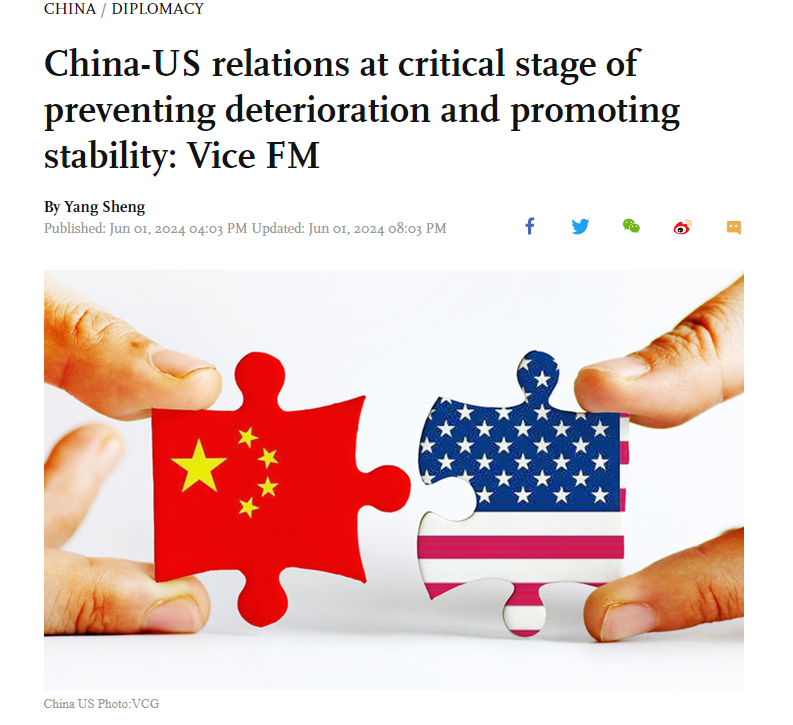LATEST INSIGHTS
Your Present Location: LATEST INSIGHTSDiao Daming: China-US relations at critical stage of preventing deterioration and promoting stability: Vice FM
Source: GT Published: 2024-06-01

China-US relations are at a critical stage of preventing deterioration and promoting stability and the US' approach of seeking dialogue while harming China's interests is unworkable. There is no future in zero-sum games under the guise of competition, and China will not accept suppression or deprivation of its legitimate development rights, Chinese Vice Foreign Minister Ma Zhaoxu said while holding consultations with US Deputy Secretary of State Kurt Campbell in Washington on Thursday local time.
Ma is paying a visit to the US from Thursday to Sunday at the latter's invitation. According to a release from the Chinese side on Friday, during Ma's consultations with Campbell, both sides had a candid and in-depth exchange of views on China-US relations and international and regional issues of mutual concern. The talks were described as constructive.
Chinese analysts said on Saturday that Ma's visit to the US, on one hand, is to maintain communication between the two countries and make the most important bilateral ties of the world more predictable, while on the other hand, it also sends a clear message from China to the US on critical topics like the Taiwan question and the Ukraine crisis, to make sure the US understands the consequence of crossing China's red lines.
Ma said the bilateral relations are at a critical stage of preventing further deterioration and promoting stability. Implementing the important consensus reached at the meeting between the two heads of state in San Francisco last November, further stabilizing and developing China-US relations, is in the interests of both countries and is a common expectation of the international community.
The US should meet China halfway and implement President Biden's commitments. China is committed to stabilizing and developing China-US relations while firmly safeguarding its national sovereignty, security, and development interests, said Ma.
The US' approach of seeking dialogue and cooperation while harming China's interests is unworkable. There is no future in zero-sum games under the guise of competition, and China will not accept suppression or deprivation of its legitimate development rights, Ma said.
'In the first half of 2024, we see that the US suppression and hostile measures against China in all fronts still exist and are even increasing despite some communication channels being rebuilt. From China's perspective, we hope to manage the differences by communication and stabilize the tension. However, unfortunately, the US is not thinking in this way, as Washington believes that as long as the communication exists, the US can be more assertive and aggressive to take actions against China's core interests and development,' Li Haidong, a professor at the China Foreign Affairs University, told the Global Times.
During the meeting, Ma also emphasized that the Taiwan question is the first red line that must not be crossed in China-US relations, and that it is the most important and sensitive question. 'Taiwan independence' and peace in the Taiwan Straits are incompatible. If the US truly wants peace and stability in the Taiwan Straits, it should adhere to the one-China principle and the three China-US joint communiqués, and fulfill its commitment not to support 'Taiwan independence.'
Ma noted that the so-called 'small yard, high fence' strategy by the US has become an 'iron curtain.' China urges the US to stop politicizing economic, trade, and technological issues, stop hyping the so-called 'overcapacity' topic, cancel the tariffs on Chinese products, and lift illegal unilateral sanctions against Chinese enterprises.
Ma also expounded China's position on the South China Sea issue, saying that maintaining peace and stability in the South China Sea is in the common interests of regional countries and all parties. The US should stop encouraging and supporting provocations, stop creating confrontations in the Asia-Pacific region, and stop deploying ground-based intermediate-range missiles. The US should take concrete actions to maintain regional peace and development momentum.
Decision-makers in Washington should understand that if it keeps provoking and offending China in a number of key fields, it could lead to retaliation and new tensions, and this will not be good for the US, as before the presidential election at the end of this year, Washington is seeking a stable internal and external environment and the Biden administration doesn't want to see more uncertainty, as it is already dealing with huge headaches in Ukraine and Gaza, said Chinese experts.
'China has its own consistent and clear position on the Ukraine crisis. By making groundless accusations against China on the pretext of the Ukraine crisis, the US will not only fail to solve any problem, but will also make trouble that is not supposed to be a part of bilateral relations at all. This unwise move will undoubtedly further complicate China-US relations rather than stabilizing the status quo,' according to Diao Daming, an associate professor from Renmin University of China.
'If the US believes that it could provoke China on Taiwan question and the South China Sea issue, and dealing with the crises in Ukraine and Gaza at the same time, it will surely have more headaches,' said a Beijing-based expert on international relations who asked for anonymity.























































































 京公网安备 11010802037854号
京公网安备 11010802037854号





